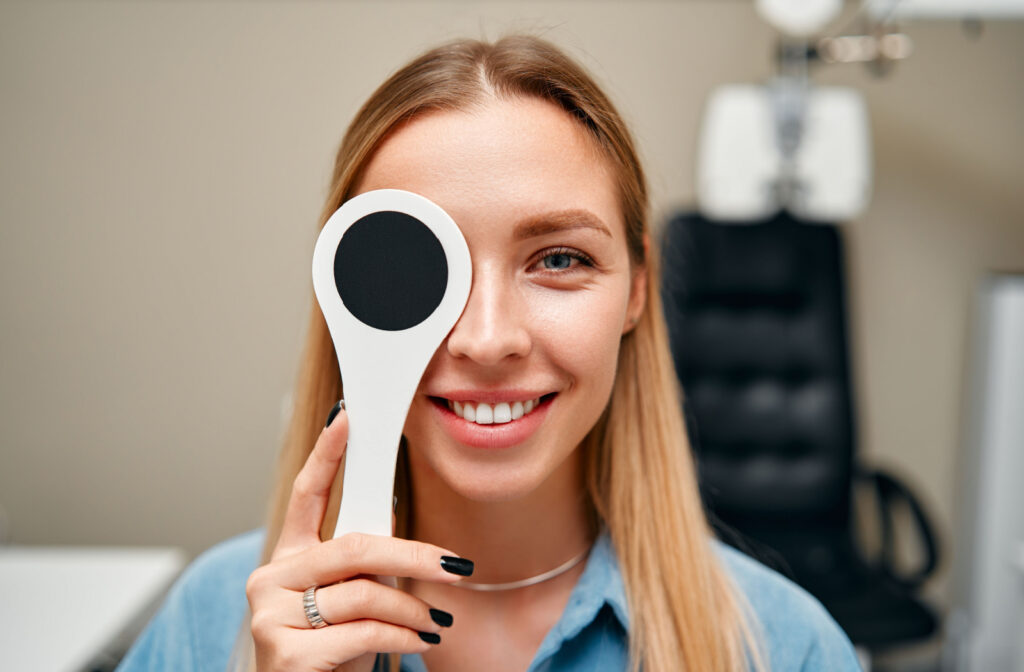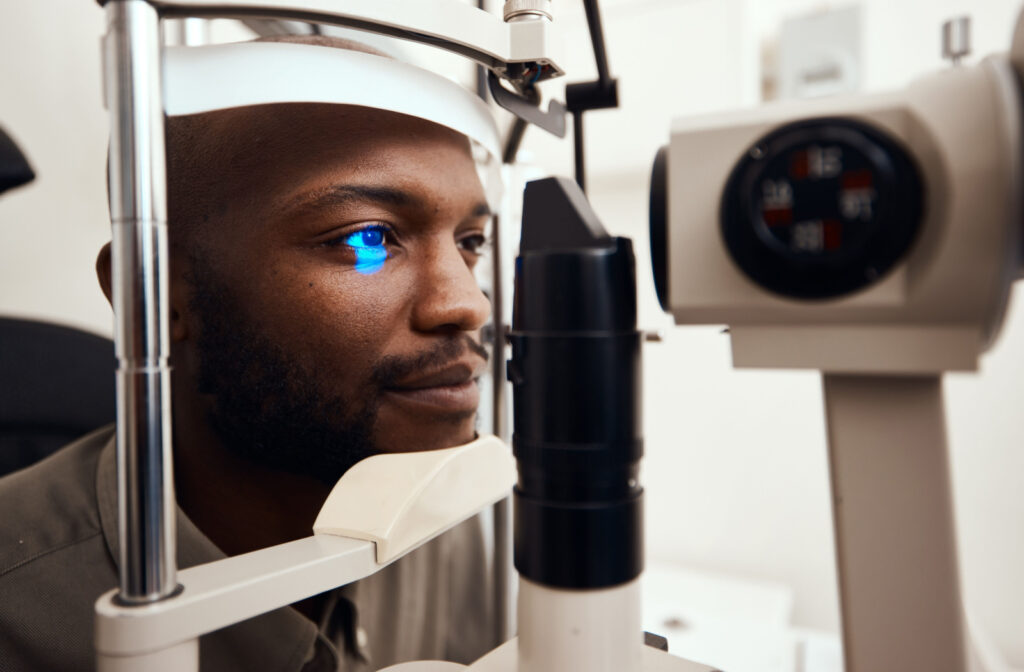Visiting your eye care professional for a comprehensive exam could not only improve your ocular health but also benefit your overall well-being. We’ll explore what a comprehensive eye exam entails, why it’s crucial for both your eye health and general health, and how it can ultimately save you time and money in the long run.
The tests performed during a comprehensive eye exam include:
- Visual acuity test
- Refraction test
- Eye muscle movement test
- Pupil response test
- Eye pressure check
The Importance of Eye Health
As we navigate the digital age, it’s vital to prioritize eye health like never before. Comprehensive eye exams aren’t just for those with existing vision problems- they’re a critical tool for identifying potential issues before they become major concerns.
From early detection of glaucoma and cataracts to assessing overall eye health, comprehensive exams offer a complete picture of a patient’s visual health. So don’t wait until it’s too late- schedule your next eye exam today and take the first step in prioritizing your vision.
A Comprehensive Eye Exam
A comprehensive eye exam is a thorough evaluation of the health and function of your eyes. During this exam, your eye doctor will use a variety of tests and procedures to assess your vision, eye alignment, and ocular health.
This type of exam goes beyond just checking your visual acuity and includes a detailed assessment of the structures of the eye, such as the retina and optic nerve. Your eye doctor may also use specialized equipment to measure your intraocular pressure and screen for diseases like glaucoma or cataracts.
A comprehensive eye exam not only helps detect and diagnose vision problems but also provides a baseline for monitoring changes in your visual health over time. Your eye doctor will work with you to understand your unique needs and concerns and tailor the exam to your specific situation, making it a patient-centric experience that is both informative and reassuring.
Components of an Eye Exam:

Visual Acuity Test
When it comes to maintaining our health, we often neglect our eyesight- until there’s a problem. However, regular vision tests are essential for catching potential issues before they become significant problems. A visual acuity test is a quick, painless, and non-invasive way to assess your overall eye health.
Here at our practice, we understand that visiting the eye doctor can be a daunting experience for many people. That’s why our team takes a patient-centric approach to every eye exam. Our knowledgeable staff will guide you through each step of the test, ensuring that you understand the process and feel comfortable throughout.
By scheduling a visual acuity test with us, you’re taking an essential step in maintaining your eye health and preserving your vision for years to come.
Refraction Test
The refraction test is a crucial tool used by optometrists to assess a patient’s vision and determine the appropriate prescription for glasses or contact lenses. This test measures the refractive error of the eye, which is the amount of light that bends as it enters the eye.
Your eye doctor will use a device called a phoropter or refractor. You look through the device and focus on an eye chart 6 meters in front of you. The refractor contains lenses of different strengths. One eye at a time, these lenses are placed in front of you.
The eye doctor will then ask if the chart appears more or less clear when the various lenses are in position. The results of the test depend on your responses. Also, a device shines specialized light into your eyes and determines your refraction.
Eye Muscle Movement Test
As part of a comprehensive eye exam, your eye doctor may perform an eye muscle movement test. This test assesses the coordinated movements of your eye muscles to detect any potential problems that may impact your ability to see.
During the exam, your doctor will ask you to follow a moving object with your eyes while they watch the movements of your eyes. The test is approachable and painless, and it only takes a few minutes to complete.
By assessing the function of your eye muscles, your doctor can identify any issues that may require treatment, such as eye muscle disorders or neurological conditions. Your eye doctor will explain the results of the test to you in a patient-centric manner, ensuring that you fully understand the outcome and any recommended treatments.
Pupil Response Test
Performing a pupil response test is a crucial part of examining a patient’s neurological function. This diagnostic procedure involves shining a light into the eye to observe the size and reactivity of the pupils. By assessing the pupil response, we gain insight into the integrity of the patient’s brainstem, which controls the body’s involuntary functions such as breathing and heart rate.
At the same time, we recognize the importance of making patients feel comfortable and understood during this process. That’s why adopting an approachable and patient-centric attitude is essential for effective communication and care. With a combination of expertise and sensitivity, we can assess our patients’ conditions and provide the most appropriate treatment.
Eye Pressure Check
When it comes to taking care of our eyes, a regular eye pressure check is an integral part of that process. Not only can it help detect conditions like glaucoma early on, but it can also give you peace of mind knowing that your eyes are functioning correctly.
How Often?
Generally speaking, adults should schedule an eye exam every two years, while those over the age of 60 should do so annually. For individuals with a history of eye problems or chronic illnesses such as diabetes, yearly exams are also recommended.
Benefits of Routine Exams
There are many benefits of routine comprehensive eye exams. It can detect and prevent vision problems and diseases. Not to mention, the potential cost savings for you in the long run. Lastly, the exam is great for maintaining overall eye health and vision. Don’t put off a comprehensive eye exam. Reach out to us at Alcona Eye Care Centre and book an appointment today.




